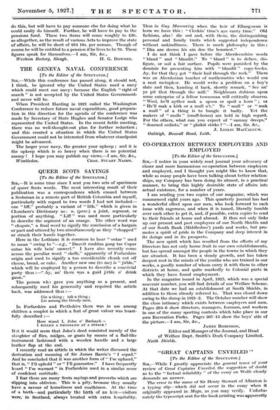QUEER SCOTS SAYINGS
[To the Editor of the SPECTATOR.] SIR,—It is some time since I sent you two sets of specimens of queer Scots words. The most interesting result of their publication was a correspondence which ensued between a Scotsman in a remote part of British Columbia and myself, particularly with regard to two words I had not included— one " lift" probably a variant of " lith," which is given in Chambers's Dictionary as : n. (pros.) a joint, segment, or portion of anything. " Liff " was used more particularly to describe the segment of an orange. The other word was " chapsie," a final word to signify the conclusion of a bargain or pact and uttered by two simultaneously as they "chapped" or struck their hands together.
Here in the Lothians it is common to hear " ontae " used to mean " owing to "—e.g., "Dauvit couldna gang the Cupar ontae his wife bein' onweel." I have also recently come across the peculiar word " skelb," apparently of Forfarshire origin and used to signify a too considerable chunk cut off cheese, bread, or cake. Another new one (to me) is " jirble," which will be employed by a person to describe a convivial party thus :—" Ay, an' there was a guid jirble o' drink gatm."
The person will gave you anything as a present, and subsequently rued his generosity and required the article back, was addressed thus :— Gie a thing ; tak a thing ;
Lie among the bloody men.
In Forfarshire and Perthshi'e there was in use among children a couplet in which a feat of great valour was boast- fully described :-
Here stand I, John o' Bathayk- I KILLED A THOOSAND AT A STB.A.IIL
But it would seem that John's deed consisted merely of the slaughter of flies, midges, or gnats by means of a flail-like instrument fashioned with a wooden handle and a large leather flap at the end.
I recently read an aftiele in which the writer discussed the derivation and meaning of Sir James Barrie's " I sepad." And he concluded that it was another form of " I'se uphaud," that is, " I'll uphold " or " I'll guarantee' I have frequently heard " I'se warrant " in Forfarshire used in a similar sense of confident certitude.
I fear there are many Scots sayings and proverbs which are slipping into oblivion. • This is a pity, because they usually have a savour of homeliness and couthiness. At the time of a birth—and particularly the birth of an hair—visitors were; in Scotland, always treated with extra hospitality. Thus in Guy Mannering when the heir of Ellangawan is born we have this : " Cleckin' time's aye canty time." Old fashions, alas ! die out and, with them, the distinguishing personal and family traits which suggested independence without unkindliness. There is much philosophy in this : " Ilka ane deems his aM doo the bonniest."
I do not think I gave before the Aberdeenshire words " bland " and " blaudit." To " bland " is to deface, dis- figure, or soil a fair surface. Pupils were punished by the dominie for presenting him with " blaudit " copy-books. Ay, for that they got " their kail through the reek." There was an Aberdonian teacher of mathematics who would use a neat metaphor. He would write a problem on a boy's slate and then, handing it back, shortly remark, " See an' ye pit that through the mill." Neighbours dubious upon some enterprise of a fellow townsman will critically observe. " Weel, he'll ayther mak a spoon or spoil a horn " ; or " He'll mak a kirk or a mull o't." To " mull " or " mak a mull " of a thing is to bungle it badly. Yet the makers of " mulls " (snuff-boxes) are held in high regard. For the others, what can you expect of " sammy dreeps," " dozened eediots," or " glaikit stirks ? "—I am, Sir, &c., -
J. LESLIE MACCALLUM.
Oakleigh, Boswall Road, Leith.


















































 Previous page
Previous page